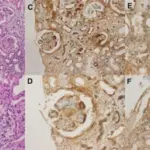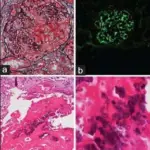Fibrillary glomerulonephritis is a disease of the glomerulus that is characterized by the deposition of the fibril proteins in the glomerulus.
What is the Pathology of Fibrillary Glomerulonephritis?
The pathology of fibrillary glomerulonephritis is:
-Etiology: The cause of fibrillary glomerulonephritis is malignancies, autoimmune diseases,
-Genes involved: Unknown.
-Pathogenesis: The sequence of events that lead to fibrillary glomerulonephritis
-Morphology: The morphology associated with fibrillary glomerulonephritis shows an accumulation of nonbranching randomly arranged fibrils.
-Histology: The histology associated with fibrillary glomerulonephritis shows mesangial expansion, endocapillary proliferation.
How does Fibrillary Glomerulonephritis Present?
Patients with fibrillary glomerulonephritis typically male present at the age range of 55-60 years. The symptoms, features, and clinical findings associated with fibrillary glomerulonephritis include hematuria, proteinuria, renal insufficiency, and hypertension.
How is Fibrillary Glomerulonephritis Diagnosed?
Fibrillary glomerulonephritis is diagnosed by microscopic examination.
How is Fibrillary Glomerulonephritis Treated?
Fibrillary glomerulonephritis is treated with rituximab.
What is the Prognosis of Fibrillary Glomerulonephritis?
The prognosis of fibrillary glomerulonephritis is poor.



